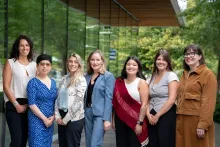
An interprofessional health student placement project in northern BC has demonstrated what students value and desire in a rural placement.
The project tested a learning model designed to improve students’ rural and remote placement experience, promote interprofessional collaboration, and provide meaningful interaction with learners from other health disciplines.
Results of the project contributed to the Rural Education Acceleration and Collaboration in Health (REACH) framework. Facilitated by UBC Health, REACH is intended to increase the number of health student placements in rural and remote areas of BC. REACH aligns with the Better Health Together strategic priority to help health programs develop models that build placement capacity across the province.
It was a really great experience and learning opportunity, as it gave me connections with other healthcare students in my health authority and provided a safe space to debrief after clinical.
A team from UBC Health, health programs within UBC and at the University of Northern British Columbia (UNBC), and Northern Health collaborated on the project’s design, with UBC and UNBC providing administrative and communications support. Two rural clinicians acted as interprofessional coaches and facilitators for the Smithers/Terrace/Kitimat area and Prince George. Students from dietetics, medicine, nursing, occupational therapy, and speech-language pathology participated in five Zoom sessions with their coaches and cohort before and during their placement as a way to:
- network with an interdisciplinary group of peers completing a placement in the same geographic location;
- build collaborative practice skills with other health student learners;
- receive mentoring support;
- interact with and learn from Northern Health’s Indigenous patient liaison;
- increase their awareness about the local area; and
- engage in recreational and community activities.
In their evaluations, students said they valued the virtual interaction for both educational and social activities and appreciated gaining knowledge and insight into other disciplines’ roles and perspectives.
This project enabled students with diverse experiences to gain a greater understanding of each other’s chosen fields of practice, while also forming relationships using a platform designed to meet their needs in a supportive environment.
One of those students was Linae Minaker, a speech-language pathology masters student in the School of Audiology and Speech Sciences in the UBC Faculty of Medicine. Linae completed her placement at the University Hospital of Northern British Columbia and the BC Cancer Centre for the North in Prince George. It was her first placement in a rural community.
“It was a really great experience and learning opportunity, as it gave me connections with other healthcare students in my health authority and provided a safe space to debrief after clinical,” says Linae. “I especially found it valuable to discuss the various scopes and different perspectives we had on case studies, including how we might resolve conflict with each other. This supported my ability to deal with conflict on my placement and helped me figure out whom to refer patients to. Having a rural placement helped round out my education.”
For preceptors, the interprofessional student placement project provided improved insight into student needs and guidance on how to mentor students and integrate them into new communities.
“Students worked collaboratively with peers of varying backgrounds, and this layer of peer support hadn’t been present in previous placement opportunities,” says Tysen Leblond, Executive Lead for Rehabilitation Services for Northern Health and the interprofessional coach for Smithers/Terrace/Kitimat. “This project enabled students with diverse experiences to gain a greater understanding of each other’s chosen fields of practice, while also forming relationships using a platform designed to meet their needs in a supportive environment. This type of program is highly valuable for students completing rural placements and should be made available in order to maximize their northern experiences.”
The interprofessional project demonstrated that inter-institutional collaboration is vital in developing and supporting a program that provides students with rural and remote placements that are meaningful and prepare them for team-based care.
The project also demonstrated the importance of engaging local coaches/facilitators who have regional knowledge of health services and communities and who could take some of the teaching burdens off the discipline-specific preceptors. Collaboration and coordination were also important for student recruitment to northern, rural, and remote placements during the same time of year and to provide enrichment experiences with local mentorship and connections with clinicians and community.
Carrie Krekoski, Practice Education Manager for UBC Health, says the project’s design, delivery, and success were key to informing the framework for REACH. “The interprofessional project demonstrated that inter-institutional collaboration is vital in developing and supporting a program that provides students with rural and remote placements that are meaningful and prepare them for team-based care. The lessons learned provided the foundational elements of REACH.”
On October 21, UBC Health is hosting an online rural health symposium to present the REACH framework and recommendations. The symposium is for health partners in rural/remote areas of BC who have a role in practice education. The event is part of UBC Health’s Collaborative Health Education Symposia, which facilitate knowledge exchange and synergies, mobilize and coordinate partners, and create an impetus for internal collaboration in an effort to activate and channel the health assets of the university towards collective aims.
If you are interested in attending the rural health symposium, please email ubchealth.comms@ubc.ca with your name, role, and organization, and we'll send you an invitation to register.
Posted on September 13, 2021



